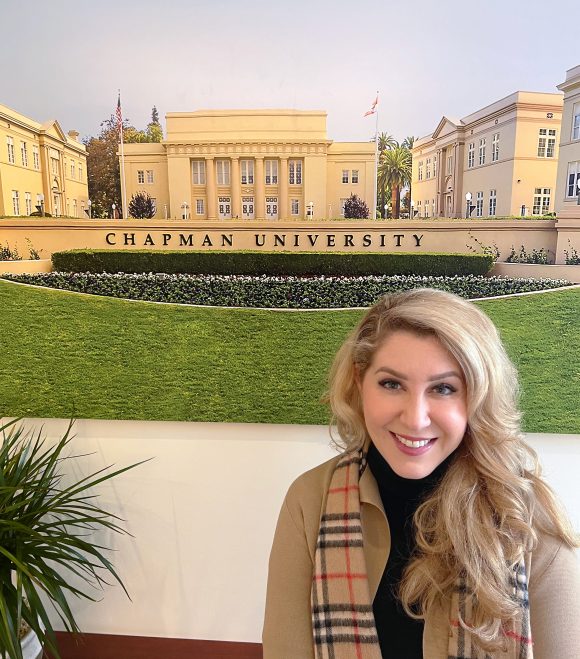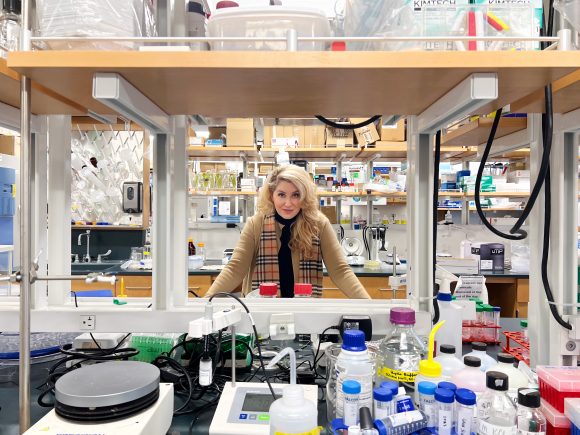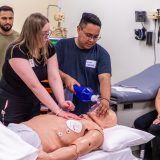Women in Leadership: Dr. Emmanuelle Schwartzman
March 21, 2023
If there’s anyone who can give Wonder Woman a run for her money, it’s Dr. Emmanuelle Schwartzman. While serving as the Chair of the Department of Pharmacy Practice at Chapman University School of Pharmacy (CUSP), Dr. Shwartzman also serves as Immediate-Past President for the Rho Chi National Honor Society and is an active member in AACP, ACCP, ADA, AADE, APhA, ASHP, CPhA, CSHP, Phi Delta Chi, and PLS… Did we mention she’s also raising a family?
Dr. Shwartzman also has quite the trophy shelf, including the 2015 Rho Chi National Advisor Award and the ASHP Foundation 2017 Residency Preceptor of the Year Award. As part of Women’s History month, we chatted with Dr. Shwartzman to get her take on her experiences being a woman in leadership in STEM.
Below: Dr. Emmanuelle Schwartzman, Chair of the Department of Pharmacy Practice
Welcome to CUSP! As one of our newest faculty members, we’re so excited to have you talk about your experiences and get to know you. Some students even submitted questions, so let’s start off with one of theirs: How did you get involved in research?
I started doing lab research as an undergraduate and was lucky to have a summer internship at a bio-engineering genetics lab as a student. I had my first major independent research project as a resident. Residency and Fellowship training is excellent for formal training in doing a research project from conception to publication under the mentorship of your preceptor. Like in all areas of a career, you need mentors to be successful and research is not an exception to this. I was fortunate to collaborate with others on various research projects over the years.
That’s so true. Having a mentor can really make a difference in how people early in their careers grow into their future. Did you have a woman role model in your life in your earlier years that shaped how you approach STEM?
I was fortunate to be mentored by a woman when I started my career in academia. I would not be where I am in my career now without mentorship and guidance from wise women in my field. In my formative years, I really did not have any encouragement to pursue or explore STEM.
Left: Dr. Emmanuelle Schwartzman, Chair of the Department of Pharmacy Practice
As a kid, what do you think you would have been career-wise? Were you aware of the possibilities in STEM or pharmacy?
No, I wish I had known more about STEM fields when I was younger, I stumbled into pharmacy accidentally. I had an eclectic idea of what I would be when I grew up, I was going to win an OSCAR, be an astronaut, be an archeologist (more like Laura Croft), and write novels.
It’s not too late, I believe in you! With all your accomplishments I wouldn’t be surprised if you won an OSCAR later in life. Until then, tell me about how you have seen the culture surrounding women in the industry change since you learned about the opportunities in pharmacy. Have you seen a rise in women in management, administration, or other leadership opportunities?
It depends on what part of the industry we are discussing. In the community pharmacy, many of the Pharmacists are female but within the corporate level and within leadership roles in Pharma it is still dominated more by males. We are seeing more females take on national leadership roles within professional organizations which is amazing! I am proud to be a woman who held a leadership position within the National Rho Chi Society, but there is still work to be done in management and administrative positions, especially in academic institutions. Despite women making up almost half of the faculty positions in the US, upper administration/ and leadership positions within universities are usually filled with men. The numbers are much worse if we start to look further at minority groups holding leadership positions. So yes, there has been improvement…. But no, we are not where we should be.
Tell me more about being the President of Rho Chi. Since the society’s founding in 1922, you’re only the fifth president who is a woman… Why? Is the membership mostly composed of men?
Historically, honor societies were primarily composed of men. In addition, most upper academic positions were held by men who ended up serving as the Presidents of these societies. If less women are in top administrative positions (Associate Deans and Deans), then less women are able to step into these top-level positions within large professional organizations, since many of these organizations want someone who has a large scope of experience to bring to the table.
Below: Dr. Schwartzman in the Rinker Campus laboratories
The world is changing for the better, slowly but surely, and you and your fellow women in leadership are a testament to that. What else would you like to see improved in the future?
Like so many women and minorities within other industries, I think we all want the same things- equal opportunity, equal pay, and to be seen for our work rather than our gender, race, ethnicity, et cetera. AACP is doing a nice job through their mentorship program, I have had wonderful opportunities to mentor some young female faculty through this program. It would be nice to see more of these types of structured mentorship opportunities being afforded in all areas of our profession, like leadership ladder programs for women and minorities.
That would be awesome to see more of those mentorship programs to elevate women and equalize women holding leadership positions in the industry. As the future comes and more of these programs arise, how can we include these upcoming women leaders that are also moms and who are under pressure to balance their time?
This is hard for me to answer because as a mom, there really is no such thing as “balance”. The pendulum will always swing back and forth between demands at work and demands at home. There will be periods of time you are less focused at work and then periods of time you are less connected at home, I guess you can call the outcome of doing your best in both places a balance. I think having mentors who have “balanced” both is important. I think providing women with adequate maternity leave and support is also important. I would love to see support groups for new moms who want to also grow in their careers.
It surprises me that there aren’t already societies for women in pharmacy to serve as support groups since there seems to be a big market for them. If you could go back in time, what advice would you give your 25-year-old self?
Don’t be afraid to lean in. Don’t be afraid to embrace your true self and be confident. Basically, don’t be afraid to embrace life and let go of any imagined obstacles.
Do you have any other advice for women looking into the pharmaceutical industry? Or words of wisdom for anyone looking to make the future of pharmacy more inclusive?
Overall, I think Pharmacy is an excellent career for women and working moms. You can impact patients in a positive way, grow in your career, and maintain a good family life. I would just remind women who become successful to remember to pay it forward to the next generation of girls/women coming behind them by providing their words of wisdom and mentorship.




